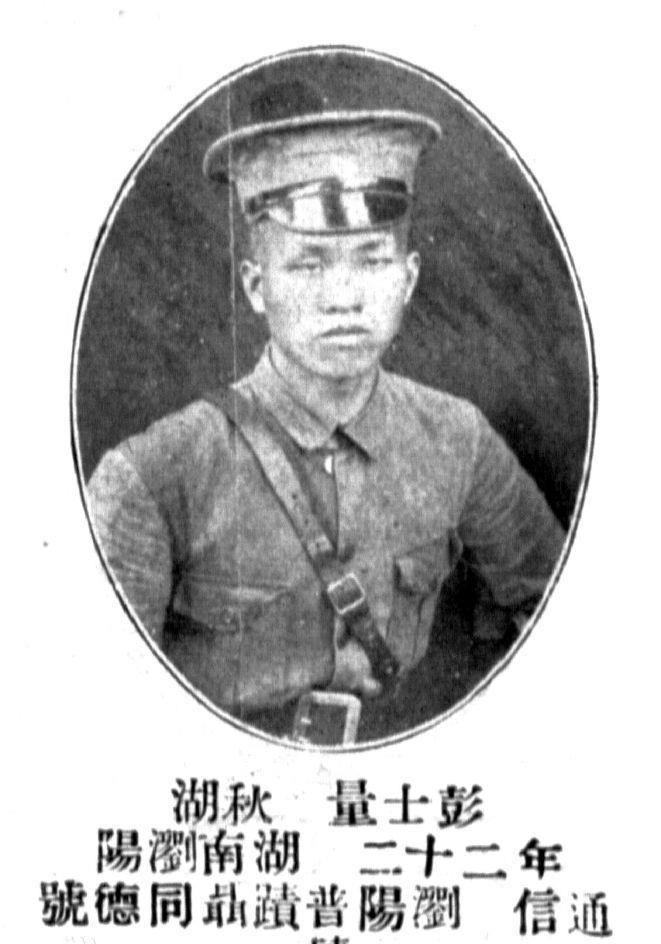He was a 4th-term student of Huangpu and participated in the Nanchang Uprising, but later defected to Chiang Kai-shek and became the commander of the Major General Division. During the War of Resistance, he died in the Battle of Changde. So who is he? After the founding of New China, what was the evaluation of him?
His name is Peng Shiliang, and he is a native of Liuyang, Hunan.
Peng Shiliang was a student bully since childhood, and was a college student at Hubei Mingde University before applying for the Whampoa Military Academy, and was admitted to the 4th phase of the Whampoa Military Academy in 1926. Readers who are familiar with the history of the Whampoa Military Academy know that the Whampoa Phase 4 is the one with the most talents, and it is also the one that has participated more in our party, such as Lin Zong, Flood, Tang Tianji, Guo Tianmin, Wu Zhonghao, Duan Dechang, Liu Zhidan, Zeng Zhongsheng, and so on.

After graduating from Huangpu, Peng Shiliang was assigned to the 10th Division of the 4th Army of the National Revolutionary Army, and those who were also in the 10th Division at that time were Lin Zong, Su Yu, Chen Geng and others who later became senior generals of our army. Speaking of this 4th Army, its predecessor was the 1st Division of the Guangdong Army, which became the main force of the Northern Expedition after its establishment, and defeated Wu Peifu and Sun Chuanfang in Hunan and Jiangxi respectively, thus winning the title of "Iron Army". In the 4th Army, there were many members of our Party, so when Lao Chiang launched the "April 12" counter-revolutionary coup, some units controlled by our Party in the 4th Army launched the famous Nanchang Uprising in Nanchang.
On August 1, 1927, Peng Shiliang, who was the battalion commander at the time, also participated in the Nanchang Uprising with the commander Cai Tingkai, but later broke away from the rebel forces with Cai Tingkai and defected to lao Jiang's camp.
After the September 18 Incident, witnessing the increasingly serious national crisis of the country, Peng Shiliang, who was then the colonel of the 3rd Regiment of the 83rd Division's reinforcements, was indignant and vigorously advocated fighting against Japan and defending the national territory. After that, he successively led his troops to participate in the Battle of Songhu, the Battle of Xinkou, the Battle of Taierzhuang, the Battle of Wuhan, and the Three Battles of Changsha. In the war against Japan, he was almost always obedient. Therefore, he was also promoted to deputy commander and division commander of the provisional 5th Division of the 73rd Army of the National Revolutionary Army.
In early November 1943, the Japanese army mobilized more than 100,000 troops from 6 divisions and regiments to invade western Hunan and Hubei, and the Battle of Changde began.
At the Battle of Changde, Peng Shiliang's Provisional 5th Division was ordered to shimen, 100 kilometers north of Changde, to block the Japanese army and cover the retreat of friendly troops. At the Shimen position, Peng Shiliang led his troops to fight with the Japanese army for eight days and eight nights, and the casualties of the provisional 5th Division had reached 10:09, but General Peng still gathered the few remaining troops and broke through to the western suburbs of Shimen, trying to recover a position to fill the foothold.
On November 15, 1943, when the anti-Japanese soldiers of Peng Shi Lianghe Temple marched to the vicinity of the rock gate south of Xin'an, they were found by several Japanese planes circling at low altitude, and the Japanese dropped heavy bombs and strafed them with machine guns. Peng Shiliang fell in the rubble, was shot several times, died heroically, only 39 years old, he was also the first general to die in the Battle of Changde. Before dying, Peng Shiliang said to his comrades-in-arms: "The eldest husband is loyal to the country and filial piety to the nation. ”
After Peng Shiliang was martyred, the Nationalist government posthumously awarded him the title of lieutenant general in the army and was incorporated into the Martyrs' Shrine in the capital.
So, what is new China's evaluation of General Peng Shiliang?
There is a cloud in the Book of Poetry, Xiaoya Tangdi: "Brothers are on the wall, and they are insulted outside." Although General Peng Shiliang once participated in the Nanchang Uprising and surrendered to Chiang Kai-shek, in terms of national righteousness, he bravely sacrificed his life for the country, which is touching and worthy of admiration. Therefore, the new Chinese people cannot forget him.
In 1985, General Peng Shiliang was posthumously recognized as a revolutionary martyr by the Ministry of Civil Affairs, and in 2009 he was stationed in the Memorial Tower of Hunan Martyrs Park, and in 2014, he was listed by the Ministry of Civil Affairs as the first batch of 300 famous anti-Japanese heroes and heroes.